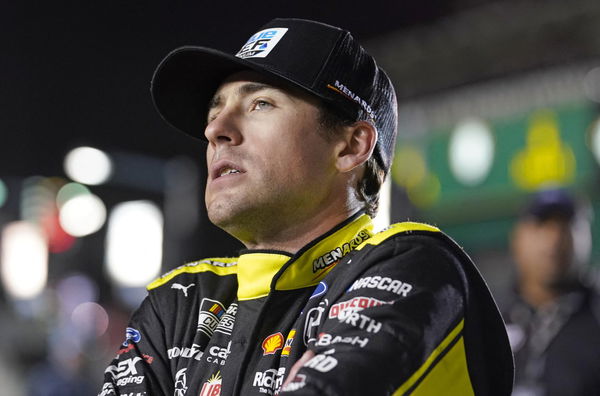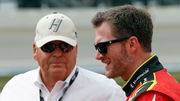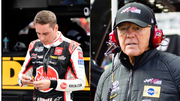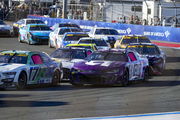
USA Today via Reuters
Feb 16, 2022; Daytona, FL, USA; NASCAR Cup Series driver Ryan Blaney (12) during qualifying for the Daytona 500 at Daytona International Speedway. Mandatory Credit: Mike Dinovo-USA TODAY Sports

USA Today via Reuters
Feb 16, 2022; Daytona, FL, USA; NASCAR Cup Series driver Ryan Blaney (12) during qualifying for the Daytona 500 at Daytona International Speedway. Mandatory Credit: Mike Dinovo-USA TODAY Sports
It is no secret that NASCAR constantly faces criticism from the fans, drivers, and teams alike. The very fact that the charter negotiations haven’t concluded yet is already a major concern for the community. While that wasn’t enough, defending champion Ryan Blaney came up with more upsetting news from the ruling body.
After a 17-race winless run, the Team Penske driver heaved a sigh of relief on Sunday after registering victory at Iowa Speedway. Understandably, the Cup Series needed last year’s championship winner to shine sooner or later. While the #12 driver looked happy on Sunday, he expressed some contrasting emotions recently.
ADVERTISEMENT
Article continues below this ad
Ryan Blaney gets candid about the drivers’ ongoing debate with NASCAR
Ryan Blaney winning his first race of the 2024 season on Sunday certainly brought a sigh of relief. While it was memorable for him to win the inaugural Cup Series race at Iowa Speedway, the short track did impress many. Safe to say, that hasn’t been the case at most short tracks this campaign.
In fact, ever since the Next-Gen car was introduced in 2022, the racing at short tracks hasn’t been up to the mark. Not just short tracks, drivers have been upset with the lack of horsepower available with the Gen-7 car. A couple of months back, Cup Series superstar Kyle Larson blasted NASCAR for keeping the horsepower low for their own agenda.
Speaking on The Dale Jr Download podcast, he said, “I feel like they’ve [NASCAR] always use the excuse of or at least I’ve heard the excuse of well you know we’re trying to keep horsepower to where you know other manufacturers might want to come in. Well, as long as I’ve been in the sport which is longer than 10 years it’s been the same three manufacturers.”
While Larson criticized NASCAR, he specified how engine builders are willing to provide more horsepower. He said, “So, maybe somebody else is coming and maybe they’re the ones pushing for lower horsepower. But I’ve yet to see anybody new come in and all these you know engine builders and teams are saying it’s not going to cost any different to do it.”
I figured with his family history of building engines, Chase Elliott would have a unique perspective on the horsepower debate. What he said about the impact if NASCAR changed its mind (to be clear — not expecting a change) and increased horsepower as well as impact on tire wear. pic.twitter.com/yN0zvnAySb
— Bob Pockrass (@bobpockrass) March 17, 2024
At the same time, NASCAR has maintained its stance on the difficulties that come with increasing the horsepower. As reported by Fox Sports journalist Bob Pockrass in March this year, NASCAR Chief Racing Development Officer, John Probst, said, “If you add the horsepower, you add the cost, then you see if it is better.”
Probst added, “There’s no guarantee you get there, and it would be any better. And I think there’s some evidence that shows as we add horsepower, they run further apart. There’s some that shows it’s better … and there’s some other shows no, might not be. So that’s a heck of a gamble to take with the entire industry.”
Clearly, NASCAR’s unwilling to risk it. Recently, Ryan Blaney spoke on the horsepower debate on The Dale Jr Download podcast. He said, “The horsepower fight is a never-ending war.” However, the Team Penske driver looked dejected as he admitted the harsh reality behind the debate, saying, “I don’t know if it’s a winnable war at this point“.
“I don’t know if it’s [horsepower] a winnable war at this point – but we are going to keep fighting!” 🐎 pic.twitter.com/eMX3W1EWDJ
— Dirty Mo Media (@DirtyMoMedia) June 19, 2024
However, Blaney claimed that the drivers will continue fighting as it looks like an easier option compared to others to improve the racing. He even suggested how NASCAR could go about it. The defending champion said, “You got to rebuild some motors. But take some plates off of them and you’re going to get a couple of hundred horsepower pretty easy. I just think that’s like what you need on short tracks.”
While Blaney put forward his perspective, here’s a look at the possible hurdle for NASCAR in increasing the horsepower.
Trending
Is a new OEM the only reason why NASCAR is hesitant to increase the horsepower?
By default, a Next-Gen car currently possesses about 670 horsepower. While drivers have demanded it to be increased to 1,000 horsepower, it isn’t as easy as it looks. There’s no denying elevating the horsepower will help the drivers in passing but it also invites other unforeseen problems.
While speaking in March earlier this year, John Probst claimed it would cost millions to add more horsepower as it would result in engine builders improving the existing pieces. While it would also increase the airflow, engine builders will need to develop new airboxes.
Additionally, throttle linkages and ECU calibrations will have to be redone. In line with the same thought process, more horsepower will cause more heat which will demand more work to the exhaust system. Now, while developing the Next-Gen car, NASCAR focused on removing excessive heat. So adding horsepower would only contradict that approach.
ADVERTISEMENT
Article continues below this ad
If NASCAR ever did decide to increase horsepower (and not implying that will happen whatsoever), I wondered if Kyle Busch would worry about impact on other components of the car. He didn’t seem too worried: pic.twitter.com/Fak5513sLI
— Bob Pockrass (@bobpockrass) March 17, 2024
ADVERTISEMENT
Article continues below this ad
While those are the technical aspects, one of the obvious reasons for not increasing the horsepower is to not discourage any new incoming manufacturer. Understandably, it is very likely for a new OEM to shy away after seeing the costs involved, especially when NASCAR is looking at alternative fuels and potential hybrid engine packages.
In all honesty, it is a tricky situation to be in. The costs involved in increasing the horsepower are a serious concern. However, at the same time, to make the race more exciting, more horsepower is certainly needed. Hopefully, there is some middle ground to this problem which would help in ending this long ongoing war between the drivers and NASCAR.
ADVERTISEMENT
ADVERTISEMENT
ADVERTISEMENT
ADVERTISEMENT






